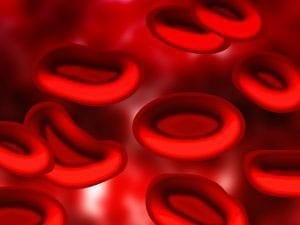Bernard-Soulier Syndrome (BSS)
What is Bernard-Soulier syndrome (BSS)?
Bernard-Soulier syndrome (BSS) is a rare inherited disorder of blood clotting. It is characterized by unusually large platelets, low platelet count (thrombocytopenia) and prolonged bleeding time. Affected individuals tend to bleed excessively and bruise easily.What are the symptoms of Bernard-Soulier syndrome (BSS)?
The symptoms of Bernard-Soulier syndrome, which are typically apparent at birth and continue throughout life, may include the tendency to bleed excessively from cuts and other injuries, nosebleeds (epistaxis), and/or an unusually heavy menstrual flow in women.What causes Bernard-Soulier syndrome (BSS)?
BSS is a genetic disorder that affects the ability of the platelets in the circulating blood to bind with a damaged blood vessel and hence to clot blood. These platelets are missing an essential protein called the glycoprotein Ib-IX-V complex (GPIb). BSS is caused by mutations in one of the Gp1b complex genes. BSS is usually inherited as an autosomal recessive genetic trait.How is Bernard-Soulier syndrome (BSS) diagnosed?
After a thorough clinical examination and a detailed patient and family history, the following measures can help confirm a diagnosis of BSS:- Complete blood count (CBC), including peripheral smear (showing giant platelets and thrombocytopenia)
- Bleeding time/platelet function analyzer-100 (PFA-100) test (both are usually prolonged)
- Platelet aggregation studies (platelets do not aggregate in response to ristocetin even after adding normal plasma but do have normal aggregation in response to adenosine diphosphate, epinephrine, and collagen)
- Flow cytometry
What are the treatments for Bernard-Soulier syndrome (BSS)?
Platelet transfusion is used to treat BSS when surgery is necessary or when there is a risk for life-threatening hemorrhage. Furthermore, antifibrinolytic agents (drugs which delay the breakdown of blood clots) are often useful to help reduce bleeding after minor surgery (eg dental surgery) or for prolonged nosebleeds. The most commonly used antifibrinolytic drug is tranexamic acid (also known as epsilon aminocaproic acid). Desmopressin acetate (DDAVP) has been shown to shorten bleeding time in some, but not all, patients with BSS. It may be useful for minor bleeding episodes. More recently, recombinant activated factor VII and hematopoietic stem cell transplantation have been used in patients with congenital platelet disorders including BSS.Where can I find out more about Bernard-Soulier syndrome (BSS)?
Bernard-Soulier Syndrome (BSS) Articles

New Research Options for Bernard-Soulier Syndrome Come in a Very Small Package
Chloe Easterbrook
November 27, 2017
Read More »

March is Bleeding Disorders Awareness Month: A Primer on Platelet Disorders
Jean Martell
March 23, 2017
Read More »


